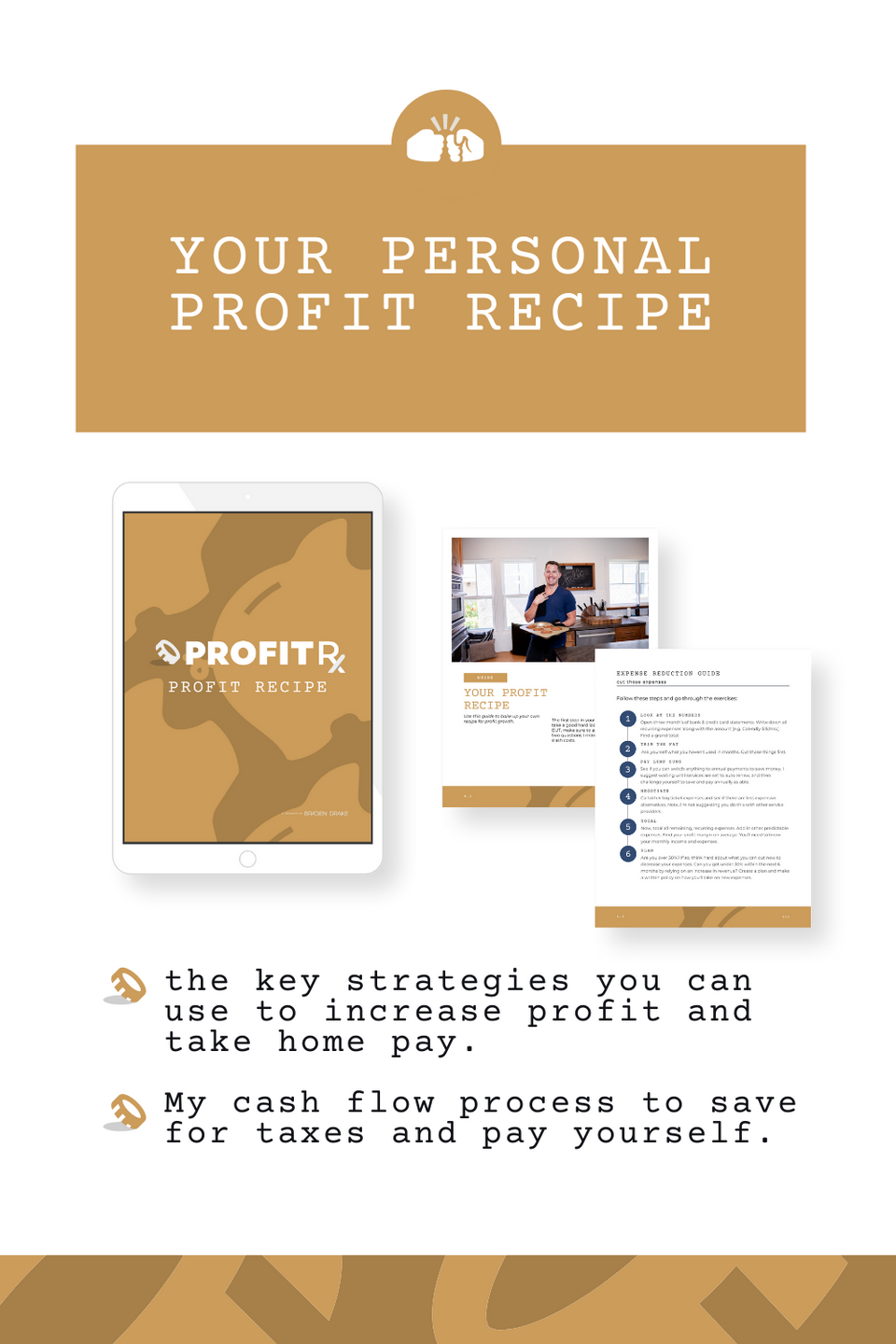At some point, most of us are told about the magical s corporation.
It’s like the unicorn of business entities. It’s unique and mysterious. Everyone thinks it’s super cool, but how do you really know? In this post, I’m going to break down the intricacies of S Corps, debunk some myths, and give you an actionable way to determine if S corps are worth looking into further.
To start, we need to discuss some basics. I wrote one other comprehensive post on business entity basics. If you don’t already understand the differences between LLCs, S corps, and corps, give this post a read.
Once you have those difference down, we dig into the key concepts necessary to unravel the mysteries of the unicorn S corp.
Before we get too far with all this stuff, let's dig into some key concepts.

Salary Versus Distribution
To make things super simple, I’m assuming that you’re a sole proprietor with no business partners. The first step to understanding S corps is realizing that you will start to pay yourself differently. As a sole proprietor, you can really do whatever you like when you get paid by clients.
When you form an S corp, what you’re effectively doing is making yourself the sole shareholder AND sole officer (employee) in your business. Think about it this way. You can own stock in a corporation and receive dividends as a shareholder. You could also be an officer/employee of a corporation and receive a salary and paychecks from the business. You could also be an employee who owns stock in the company who receives dividends and a salary. This last scenario is what happens in a S corp except that you are the only shareholder and the only employee.
Once you form the S corp you become an officer of the business and pay yourself a monthly salary in exchange for the services you perform for the business. You may then pay yourself a distribution as the sole shareholder. Only the salary is subject to Medicare and social security taxes (collectively “self-employment tax”). This is how the S corp saves tax dollars. Self-employment tax amounts to a 15.3% tax up to a certain threshold. A sole proprietor pays this percentage on top of normal income taxes. In a S corp, the distribution portion is not subject to this tax.
Sounds awesome right!? Many new business owners get super excited when they learn how the S corp works and are ready to pay themselves a low salary to saves taxes on the high distributions. Obviously, the IRS wants to prevent that, so the salary must be “reasonable.”

"Reasonable Salary"
Initially, the process of determining a salary for yourself seems super arbitrary. After all, if we are the only one running our businesses, all the money we bring in is our own money. This is the part where we have to realize that our business is its own being. We perform work for our business which needs to be compensated at a reasonable rate. Then, our business brings in its own money via things like reputation, goodwill, and the like.
Once you have determined that a S corp is the right way to go, you must determine what your salary will be. You can determine your “reasonable salary” by looking at the market rate of pay to someone providing your services, in your geographic area, with your level of expertise. Alternatively, consider how much you would have to pay someone else to do what you do. What would be a reasonable amount of pay to offer to find someone qualified to do what you do?
If you hire an attorney to form your S Corp, part of the process is doing research to determine what the reasonable salary should be. The importance of this is that S Corps are subject to fraud and abuse, so the IRS does keep a closer eye on them. Taking time to research and document your salary can help prevent some risk.

Payroll
As an officer of the S Corp taking a salary, your business is now subject to all of the same rules as any other corporation with employees. You must not only pay taxes, but you must have tax withholdings. Think about the last time you had an employer where you got regular paychecks from a payroll company. They usually have all those perforated edges and look more legit than just a handwritten check. Those checks have line items for federal and state taxes withheld from the amount paid to you. Once you have a S Corp, you’re obligated to withhold taxes just like those checks did.
You could handle these tax withholdings on your own, but the calculations for withholding are complex, and the penalties are a huge pain. Instead, you will want to pay a monthly fee for payroll services. The payroll service will connect to your bank account and withdraw funds to issue you paychecks. The checks will take out the withholdings and the payroll company will send the taxes where they need to go. You simply deposit that check into your personal bank account.
I’m an affiliate with Gusto payroll. I like Gusto because their service is more modern, and their target clients are the same as mine, small businesses and freelancers. Their system is also super simple. If you’re interested in Gusto, fill out my contact form, and in the service line just put Gusto. I’ll send a referral code and get on a call with you to help set up your account.
Ok, so we understand the basics of S Corps and how they’re going to save you some tax dollars. Now, let’s debunk some common myths I have heard about S Corps.
S Corps Are Too Complicated & Burdensome
So the first thing I want to call your attention to is the federal tax owed. The tax amount is $4,130 on $36,000. If you look at the above bracket, you'll see that this taxpayer falls into the higher end of the 12% tax bracket, but when we calculate the tax, it's actually 11.5% of the taxable income after you apply the bracket properly. Us tax pros call this the "effective tax rate." If we assumed our tax payer had taxable income of $39,000, she would fall in the 22% bracket but still have an effective tax rate of around 12%.
The second item I want to note is the amount of state income tax. California is one of the highest tax states, and you'll notice that the tax owed is about 1/4 of the federal tax. This is why I tell clients to set aside a specific amount of money and then pay 80% to federal and 20% to the state.
Lastly, I want to point out the amount of self-employment tax. It's calculated on net business income, and it's a flat rate of 15.3%. This is important for two reasons. First, you don't get the standard deduction to reduce taxable income. Second, the tax rate is not graduated on a bracket. The first dollar is taxed at 15.3% just like the last. I point this out because I'll often file returns for clients who have business profit of around $10,000. After they take the standard deduction, they're taxable income is $0, so they owe no income tax, but self-employment tax is $1,500.
I Have a Service Based Business. An S Corp Doesn't Make Sense.
As we learned from the blog post noted above, S corps can save us tax dollars by splitting our pay into two categories, salary and distribution. Your salary must be reasonable compensation for the services you perform for your business. Some people mistakenly believe that if they are only performing services in their business, all compensation must then be salary, which would negate the benefits of an S corp (savings of self-employment taxes on distributions). However, this isn’t the case.
S corps can be fantastic for individuals that provide services. Just because you only provide services doesn’t mean that your salary must be your full income. If you built a fantastic brand, you could make $125,000 a year when a reasonable salary for your job might be $55,000 per year or maybe $85,000 a year if you’re working 70 hours a week. The point is that the extra $50ish thousand is coming from something else like your goodwill in the business. This is the portion that can reasonably be called a distribution.
Let’s look at two examples of what a reasonable salary could look like.

Example 1
A quick Google search told me that in 2018 the average expected income for a photographer in Los Angeles is $71,158. Let’s assume that Elena has been a photographer for 15 years. She’s fantastic. Her clients love her, and she has a wildly popular blog. Elena is not the average photographer. She’s doing great and probably needs to take a salary higher than the average to accommodate for her experience. She decides on a $125,000 salary. Assume that in 2018, she ends up making $200,000. $150,000 through photography services, while the other $50,000 she made through selling photo albums and using affiliate links. Elena’s $125,000 salary is probably fine. She has a strong brand and presence, which helps her make more money than the average photographer even with her amount of experience.

Example 2
Now, let’s consider Paige. Paige was a hobbyist before she decided to become a wedding photographer. She had a full-time office job when her friend asked her to shoot her wedding. After that, she did a few more in the next two years. Paige left her job at the beginning of 2016 to start her photography business. She made $30,000 in 2016, $60,000 in 2017, and plans to make $90,000 in 2018. She determines that a reasonable salary for her, being three years in business is $70,000. Forming an S Corp would likely save Paige between $2,000 and $4,000 in taxes for her first year as a S Corp.
Note that these income projections might be aggressive. Don’t take them to be what you should be making. They’re just illustrative of when it is a good time to consider doing an s corp.
The real key to being able to form an s corp properly is having good cash flow.
I meet a lot of business owners who, on paper should be able to form an s corp. However, they don't have good enough cash flow to actually put themselves on payroll. That's why I started also teaching cash flow. Check out the Worry-No-More Money Roadmap freebie below for more info on my cash flow system.
You can also check out this blog post for an overview of the system.
Need some help preparing for your s corp formation?
The best thing you can do now is get started with proper cash flow and profit targets. Download the Profit Recipe for my system here.

Time for the nuts & bolts. Let’s talk costs, drawbacks, and timelines.
When is it time to form an s corp? This is the big ticket question. People tend to toss around a magic number with regard to what your income should be to know when it’s time to form an S Corp. I often hear $100,000. Other professionals say $60,000. The number really depends on your business and industry.
If a reasonable salary for you would be $40,000 and your business is netting $60,000, then you might be a great candidate. In other industries, $40,000 might not be reasonable, so the right time may not be until they hit six figures.
Ok, now is the time for math. I promise I’ll try to keep it relatively simple.
If you want a quick exercise, here’s what I recommend. Use a Google search to find the average salary for your service in your area with your experience. Then, figure out your anticipated net income for the year. If your anticipated income is more than the average, find the difference. Then calculate 15% on that difference. (Note, this math changes once you’re above the $128,000ish mark because self-employment tax reduces from 15.3% to 2.9%).
For example, if the average you find is $50,000 and you anticipate that you will net $75,000 in your business, the difference is $25,000. 15% of $25,000 is $3,750. That total is a very rough estimate of what an S corp could save you. Then, you should consider the costs of an S corp.
Costs of Forming an S Corp
-
Monthly payroll services $40-$80 per month - $480-$960 annually
-
Fees for filing quarterly payroll tax returns
-
Must keep accurate books and records and create balance sheets
-
Pay a tax preparer to file your S Corp tax return
I charge a couple hundred dollars a month for full-service bookkeeping. Add the costs of payroll to that and the annual overhead is $2,500-$4,000. If you already pay for bookkeeping the annual overhead is more like $1,000.
Cost Benefit Analysis
Let’s go back to the example above with the individual making $75,000 who we estimated will save around $3,750 form doing the S corp. She could go a few different routes:
-
She could use a company payroll and do everything else on your own. Her increased costs would be under $1,000, so she pockets almost $3,000 more at the end of the year by going with the S corp;
-
She could reallocate her tax savings towards full service bookkeeping and pro tax services and maybe save a little bit.
If a tax professional and bookkeeping is already a line item in this persons finances, she is getting a true $3,750 benefit. If she is DIYing it now, then the tax savings could either save her money or basically offset the expenses for outsourcing a task she probably needs/wants to outsource anyhow.
Disadvantages of Structuring as an S Corporation
I have from clients that they have been told not to structure as a S corp because of some of the strict rules for S corps. As we lay out these rules, you will understand that in some cases for some biz owners, they might be a deal breaker, but for many others, they are a non-issue.
Strict Qualification Requirements
In order to qualify and maintain an S corporation —the corporation must meet strict federal tax law requirements on number and type of shareholders and types of shares. Briefly stated, these include:
• Only individuals, certain estates and trusts, and certain tax-exempt organizations can be shareholders
• There cannot be more than 100 shareholders (although some family members can be counted as a single shareholder), all of whom must be U.S. residents or resident aliens.
• There can only be one class of stock (differences in voting rights is not precluded)
If you are a sole owner or only have a couple of partners, none of these requirements are an issue.
Profit & Loss Allocation
To be frank, partnership tax is a pain in the ass. My professor in my Master’s program said it was the most different class in all of law school. I was inclined to agree. I’ll try to keep it simple here.
An S corporation is required to allocate profits and losses among the owners based strictly on the percentage of ownership or number of shares held, whereas an LLC is able to allocate its profits and losses in whatever proportions the owners deem proper. In short, this means that you can’t get too creative about how you distribute profits and taxes to the owners. If you are in a 50/50 partnership with your biz partner, you must also allocate profits 50/50. To most of us this sounds like something we would obviously do, but that’s not the case in all businesses. Sometimes owners like to fiddle with allocations when one party is contributing a substantial amount of the start up capital or one partner is going to be the managing doing a lot more work. If these things ring true for your business, definitely consult a professional. If you’re solo, again, this restriction does not affect you.
Tax Qualification Obligations
Mistakes regarding the various election, consent, notification, stock ownership and filing requirements can accidentally result in the termination of S corporation status. Although this is relatively rare, and usually can be remedied easily, it is still an issue that is not a factor with other business forms.
Corporate Formalities
An S corporation will always primarily be a corporation. Therefore, it must observe all corporate formalities imposed by its home state’s Corporation Statute. In contrast, the state LLC laws have a lot less statutory formality. But in cases of conducting business outside of the home state, both corporations and LLCs will need to register. This is where it’s ideal to have a professional helping out. Corporate formalities include things like annual meetings, accurate record keeping, and proper banking. If you hire an attorney to help you form your S corp, he or she should help you with these issues.
Calendar Year
An S corporation must adopt a calendar year as its tax year unless it can establish a business purpose for having a fiscal year.
Strict IRS Scrutiny
Since amounts distributed to a shareholder may be dividends or salary, wages may be recharacterized as dividends, costing the corporation a deduction for compensation paid. Conversely, dividends may be recharacterized as wages, which subjects the corporation to employment tax liability.
Taxable Fringe Benefits
Any extra benefits supplementing the employee’s salary provided by the corporation are taxable as compensation to employee-shareholders who own more than 2 percent of the corporation.
When Is The Right Time to Form an S Corp
If you have made it this far, you’re probably on board to get yourself an S corp either now or later. The question that remains is when should you form it. There are two time requirements. If you want to have S corp status in the first year of your business entity, meaning in the first year you form your LLC, you must file for S status within two months and 15 days from the date of forming your business. For existing entities, you can change to an S corp by filing by March 15th.
For example, if you are currently a sole proprietor, but wish to become an S corp for the current year, you need to form an LLC or a C corp first. It takes 4-6 weeks for the California Secretary of State to process articles of incorporation. Let’s say you file your articles on August 1st and get them back on September 13. The deadline to file the S corp is two months after that plus 15 days. Two months after September 13th is November 13th. Plus 15 days is September 28th. If you go this route, you get S tax treatment on income received after the election.
If you formed your LLC in 2016 and now wish to become an S corp, you must file by March 15th to get S status for that tax year.
If you think an s corp is right for your business or eventually want to work your way there, I'd love to help you. Stay tuned for the next enrollment window for the Unf*ck Your Biz Group Program where I show you step-by-step how to form it.
If you're not ready for an s corp, you may still want to look into LLCs
They're one of the layers of protection for your business. Check out this freebie for more info.

CAN WE BE BESTIES?
Have questions on the blog? Need more small biz friends? Join the Facebook Group, Braden's Besties to connect.
SIGN ME THE F UP